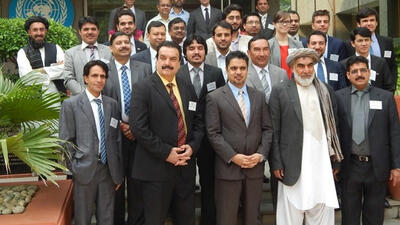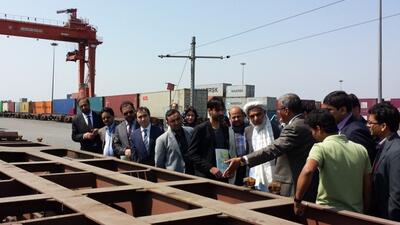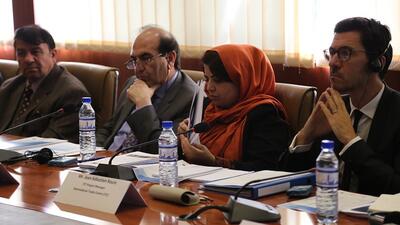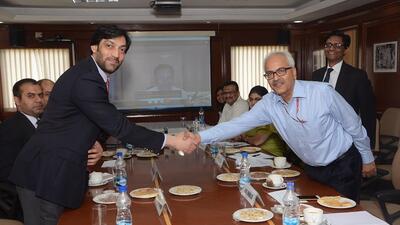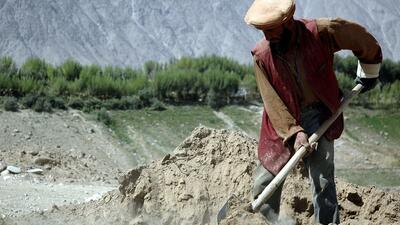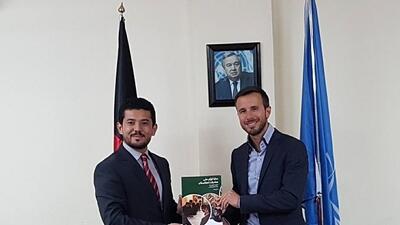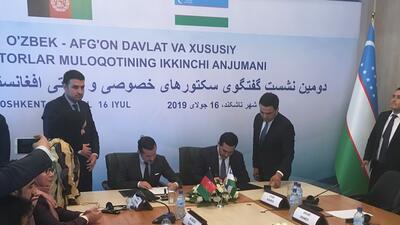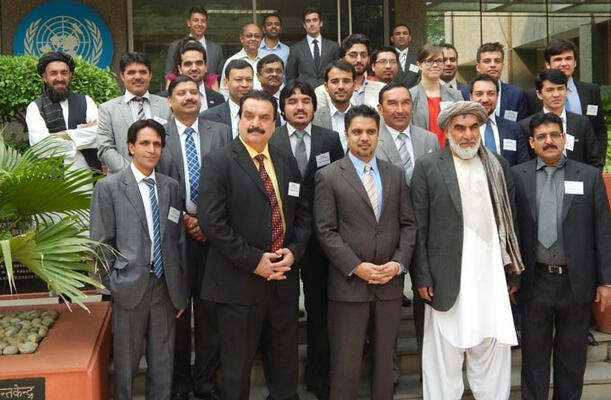
ESCAP, ITC partner to boost Afghan officials’ capacity to negotiate on WTO issues
Ahead of the forthcoming Ninth World Trade Organization (WTO) Ministerial Conference in Bali, which may conclude Afghanistan’s accession negotiation, the technical capacity of Afghan public and private stakeholders to take advantage of opportunities and address challenges of WTO membership was further enhanced with a two-day workshop organized by the South and South-West Asia Office of the United Nations Economic and Social Commission for Asia and the Pacific (ESCAP) and the International Trade Centre (ITC).
The third in a series, the technical-capacity building workshop on Afghanistan’s Accession to the World Trade Agreement held on 28-29 October in New Delhi, brought together more than 25 officials from Afghanistan’s Ministry of Commerce and Industries, the Afghan Chamber of Commerce and Industries and the Advisory Board of National Entrepreneurs of Afghanistan.
The workshop aimed to deepen participants’ understanding of highly technical multilateral trade discipline under the WTO, in particular with regards to agriculture, sanitary and phytosanitary measures, as well as technical barriers to trade and trade remedies. The workshop builds on two earlier sessions held in August 2012 and April 2013.
Delivering the inaugural address, H.E. Mr M. Ashraf Haidari, Deputy Chief of Mission and Charge d’Affairs, Embassy of Afghanistan, New Delhi, stressed that such workshops build the institutional capacity direly needed in Afghanistan and encourages public-private dialogue, critical to addressing complex issues such as those related to the country’s accession to the WTO.
'Afghanistan used to be at the heart of the Old Silk Road. Our land served as the cradle of ancient civilizations that thrived on commerce, trade and exchange of ideas,' he said. 'Today, the New Silk Road crisscrosses Afghanistan. We are naturally destined to connect the East with the West and the North with the South through transit trade, global and regional investments.'
H.E. Mr Haidari concluded: 'I hope that technical assistance in this critical area will continue in the future, until we have accomplished our shared objective of integrating Afghanistan with the regional and global economies, in part through full WTO membership.'
In his opening remarks, Dr Nagesh Kumar, Chief Economist, ESCAP and Director, ESCAP-SSWA, stressed that WTO accession for Afghanistan was an extremely important initiative as it would provide the country with an entry point into a global, rule-based multilateral trading framework, notwithstanding the challenges.
'There are two sides of the same coin; benefits and opportunities, such as special and differentiated treatments and market access at favourable terms afforded to least developed countries, versus the many challenges related to complex negotiations and the need for ensuing reforms to implement WTO commitments,' Dr Kumar stated.
'We aim to assist Afghanistan in this process and to help build the country’s capacity to understand the implications, undertake the reforms required and seize the opportunities that will arise from the country’s accession to the WTO. This is only the beginning of our engagement.'
Mr Rajesh Aggarwal, Chief, Business and Trade Policy, ITC noted: 'We are fully aware that WTO accession brings in its wake far-reaching changes in the domestic economic policy and regulatory framework, those have implications for business. Countries whose businesses have been able to prepare in advance are better placed to seize the new opportunities and cope with the challenges.'
'This latest session is part of a comprehensive programme to support private sector engagement in LDCs’ bid for WTO membership. Understanding the agreements is a beginning of a rather long road to put policies and implementation structures in place. We are ready to walk you [Afghan officials] along that road,' he stated, expressing confidence that the better understanding resulting from the session would go a long way in 'allaying the fears that are generally associated with the opening of an economy.'
South and South-West Asia is home to four least developed countries (Afghanistan, Bangladesh, Bhutan and Nepal), three of which are also landlocked (Afghanistan, Bhutan and Nepal).
Established in December 2011 in New Delhi, ESCAP South and South-West Asia Office (www.sswa.unescap.org) assists 10 member countries in the region, namely Afghanistan, Bangladesh, Bhutan, India, Islamic Republic of Iran, Maldives, Nepal, Pakistan, Turkey and Sri Lanka achieve inclusive and sustainable development through its normative and analytical work, policy advocacy and capacity-building activities and the promotion of regional cooperation.
This article was originally published by the United Nations Economic and Social Commission for Asia and the Pacific (ESCAP). Read it here.




